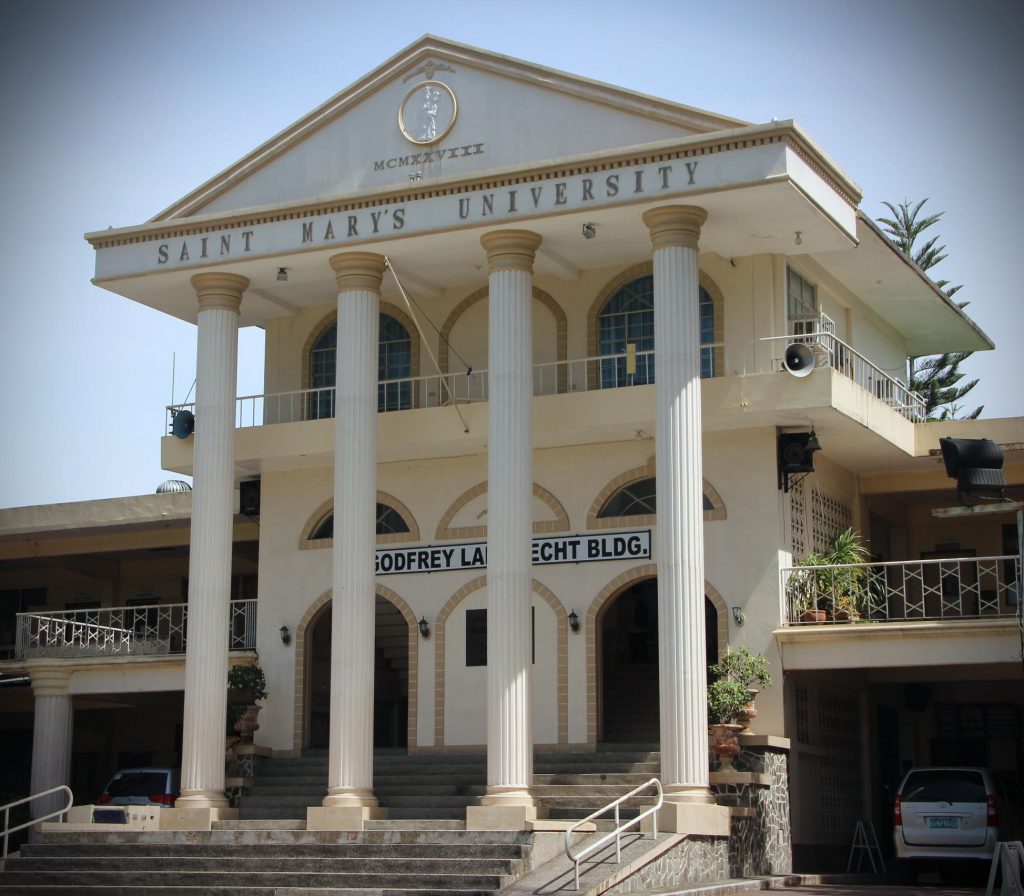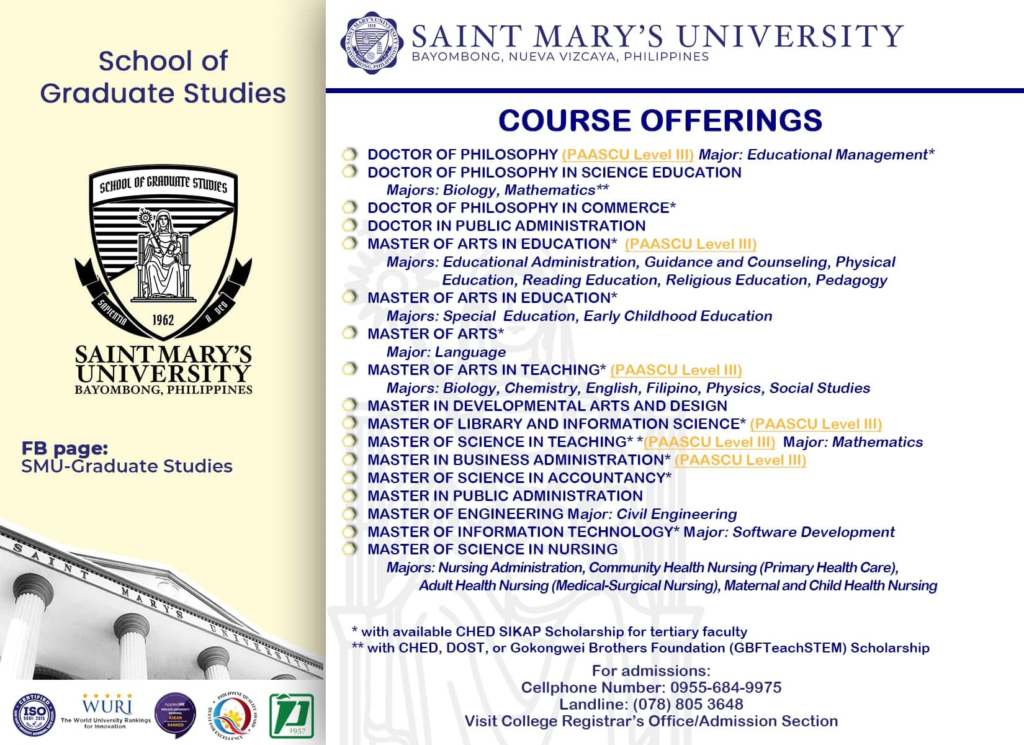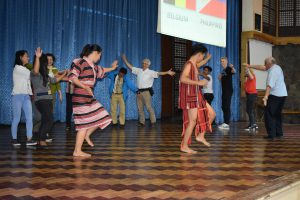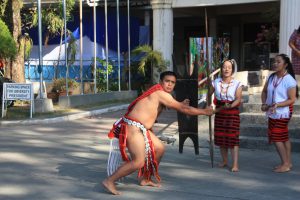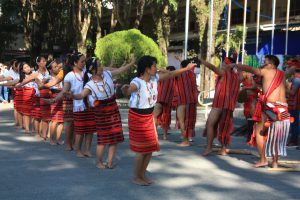
VISION
Saint Mary’s University School of Graduate Studies is envisioned as a caring and dynamic center of professional service and development committed to nurturing professionals exemplifying excellence, innovation and passion for Christ’s mission.
MISSION
We dedicate ourselves to:
- vigorously guide professionals in the utmost development of their potentials for local and global relevance and responsiveness;
- passionately empower professionals with values, attitudes and insights for an effective and productive practice of their profession, and for becoming community-supportive individuals; and
- continuously challenge professionals to explore and pursue relevant, innovative and breakthrough ideas through research and development.
HISTORY
The SMU Graduate Studies Programs evolved gradually with the offering of certain programs as indicated below:
GOALS/OBJECTIVES
The Graduate Studies serves as an instrument of professional growth and development, academic leadership, extension and meaningful research.
Specifically, the programs aim to:
- develop effective, responsible and authentic Christian professional leaders in education, government, business, industry, health system, information technology, engineering and other fields for the achievement of regional and national goals;
- develop in the students a high degree of competence in their chosen fields of specialization as committed professionals;
- develop competence in all aspects of research directed to planning and development including special interest in the preservation, transmission, and enrichment of our cultural heritage, especially in Northern Luzon;
- sharpen skills of critical and reflective thinking, inquiry and analysis;
- foster awareness of the environmental, social, economic, cultural, political situations and problems prevailing in the communities of the region, the country and the world – through social analysis – and involvement in solving these problems in meaningful projects as responsible Christian citizens;
- orient the students with the scientific and technological situations in the communities and in the process, clarify problems and issues which will eventually aid in the solution of the same; and
- disseminate the research results for appropriate utilization.
LIST OF PERSONNEL/ FACULTY
Aban, Lorna
Aceret, Robert
Acosta, Caroline
Acosta, Venica
Acpal, Catalina
Adalem, Elnora
Adducul Ivonny Lorvin
Adducul, Lorvin
Aduca, Ma. Cristeta
Agrimor, Joy Riana
Alindayu, Jefrie
Andrada II., Fernando
Antonio, Gloria Vicky
Argote II, Bobby
Asuncion, Moises Alexander
Asuncion, Zayda
Asuncion, Claribel
Baliton, Joman
Bautista, Gerome
Bautista, Michelle Kyra
Benig, Sherylou
Bulatao, Mary Grace
Bungihan, Melfei
Cabonero, David
Cabrera, Gay Marie
Cachola, Susan
Cajucom, Elsa
Calauagan, Federicia
Callang, Peter-Tom
Canaberal, Essel
Carreon, Rosalie
Coballes, Pearl Via
Constantino, Milagros
Costales, Jr., Leonido
Costales, Leslie
Covita, Mayvelyn
Cunanan, Marie Jane
Dacles, Darwin Don
Damayon, Samuel
Danao, Gertrude
De Gracia, Rommel
Del Rosario, Fe Yolanda
Divina, Leslie Doris
Domingo, Eleanor
Dulawan, Reiner
Erfe, Adelina
Ferreras, Geraldine
Galate, Me
Galate, Regino
Gallato, Cristina
Gamboa, Henry
Garces, Adonis
Garcia, Rolita Grace
Garlitos, Loreta
Gauuan, Rodelio
Gonzales, Clara
Gualon Jr., Andres
Guevara, Analyn
Gurat, Melanie
Israel, Kristine Ann
Jalijali, Ma. Concepcion
James, Haydee
Jasmin, Monaloufel Rosario
Jontilano, Mary Rose
Jubay, Alicia
Labangcoc, Marissa Lyn
Lanzuela, Febie
Leonardo, Garibaldi
Malaque, Feliciano
Mamaoag, Mabel
Mania, Edwin Edilberto
Manzano, Alfred Roderick
Marquez, Christopher Allen
Marzan, Leycel
Marzan, Paulina
Maslang, Jason Arnold
Maslang, Kenneth
Medestomas, Rodel
Medula, Cesar
Morga, Manuel
Nantes Jr., Felipe
Naval, Erwin
Navalta, Ronda
Nuestro, Ruby Lyn
Palina, John Octavious
Palina, May Juliet
Perolina, Marilyn
Pimentel, Angelino
Querol, Marites
Quiben, Elery Michelle
Ramel, Regina
Reyes, Teresita
Rivera, Rowena
Rosario, Candido Joseph
Rosario, Liberty
Santos, Aireen
Saquing, Sherween Jerry Paul
Saquing, Kevin Marf
Soliven, Santiago
Soliven, Samuel
Soriano, John Lindy
Soronel, Sharon Heidi
Tabaquero, Arlene
Taborda, Rogie
Taroma, Joan
Tayaban, John
Tayaban, Ma. Teresa
Tiam, Aurus Jodeo
Tominez, Donna Bee
Uy, Rhodora
Valmores, Judge Herson
Valtoribio, Dominga
Villanueva, Harrison
BEST FEATURES
The School of Graduate Studies underwent the PAASCU formal visit on April 11-12, 2024 and had been granted reaccreditation for five years valid until May 2029. The 16 programs are: Master of Arts in Education (Educational Administration, Guidance and Counseling, Physical Education, Reading Education, Religious Education and Pedagogy), Master of Arts in Teaching (Biology, Chemistry, Physics, English, Filipino and Social Studies), Doctor of Philosophy in Educational Management, Master of Science in Teaching Mathematics, Master of Library and Information Science and Master in Business Administration.
Contact Persons/details
Dr. Gertrude G. Danao
Dean
graduatestudies@smu.edu.ph
(078) 392-8107
0936-286-7285
